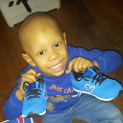In-UTR Mutations in Neuroblastoma: Functional Consequences and Therapeutic Implications
Cancer-promoting genes (a.k.a. oncogenes) are often overexpressed via a translocation to a different chromosome or an increase in gene copy number. Yet for many oncogenes there are no known mechanisms of overexpression, one textbook example being IGF1R. This suspected oncogene is highly overexpressed in most malignant tissues but is seldom a target for chromosomal abnormalities. Attempting to identify an alternative mechanism, we considered that gene activity could be effectively controlled by microRNAs (miRs). miRs are very short (~22 nucleotide) RNAs, which bind tightly to non-protein-coding segments (UnTranslated Regions, or UTRs) within canonical, protein-coding messenger RNAs (mRNAs). Binding by miRs generally results in decreased mRNA stability and prevents protein synthesis. Thus, alterations in UTRs that block mRNA-miR interactions could allow oncogenes, such as IGF1R, to escape regulation by miRs and therefore increase their expression levels. However, up until now UTRs had been largely neglected in large-scale cancer gene analysis projects. Our analysis of recent neuroblastoma sequencing data partially filled this void and confirmed that dozens of putative cancer genes indeed accumulate recurrent mutations in UTRs, which frequently map to predicted miR binding sites. Provocatively, in our cohort, IGF1R was the gene by far most frequently affected by 'in-UTR' mutations. Under this proposal, we will validate the contribution of these mutations to IGF1R activation. We will also address the hypothesis of therapeutic significance: that altered UTRs of IGF1R could be targeted by artificial miRs with compensatory mutations, resulting in oncogene re-silencing.

